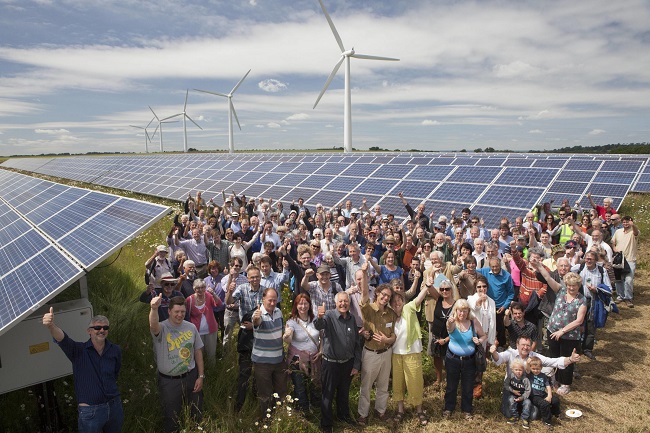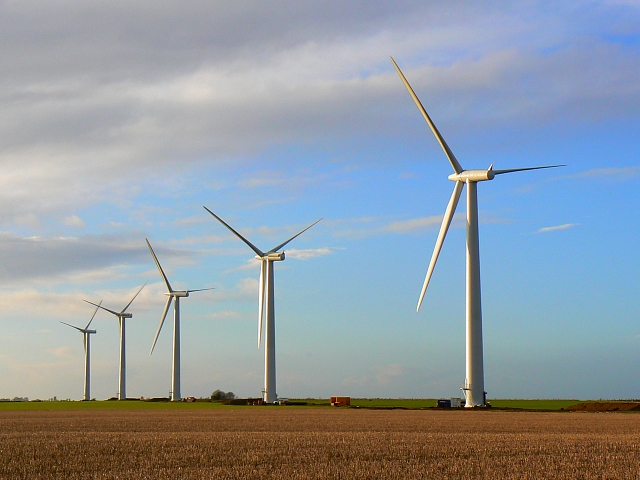- Case studies
- Westmills Smart and Fair Neighbourhood Trials

Westmills
Smart and Fair Neighbourhood Trial
The Westmills trial formed part of Project LEO’s Smart Fair Neighbourhood (SFN) projects. These were six sets of local trials that explored how Smart Community Energy Scheme (SCES) business models can sit at the heart of a smart, low-carbon, locally balanced energy system, creating opportunities and benefits in an equitable and fair way for everyone.
What are the Westmills?
‘The Westmills’ are made up of an existing group of community renewable energy assets – Westmill Solar and Wind Co-ops, Westmill Sustainable Energy Trust (WeSET) and a Smart Grid CIC.
Within the group are two established community energy co-operatives, each owning separate energy generation assets on the same site. The Westmill Wind and Solar Co-operatives have operated a 6.5MW wind farm and 5MW solar farm, respectively, for around 10 years, making them two of the longest-established community energy groups in the UK.
There are also plans for a new battery storage facility on the Westmill site at Colleymore Farm in Oxfordshire that can store any excess energy generated by the wind and solar assets and enable them to participate more easily in an energy flexibility market.
Collectively, they have more than 3,000 cooperative members who can’t yet share the benefits of trading directly despite the overarching ambition of the Westmills to generate energy for use by their members.
As well as creating clean energy, the Westmill assets enable community benefit funding, educational work and local energy conservation and clean energy initiatives.
What was the aim of the Westmills SFN trial?
As the cooperatives have evolved, they are looking to identify new business models for the future. They wanted to explore how their existing grid-scale wind and solar generators on a shared site can move beyond ‘just’ generating. They were interested in exploring how energy flexibility services might play a role in their future operating models and/or investment cases that would deliver on the co-operatives’ long-term vision.
As part of Project LEO, the aim was to learn how these co-ops and assets can work together to create a local, low-carbon energy system for the future, looking at ways the solar and wind generation can combine and link with the battery storage facility to provide flexibility services to the local grid and what the benefits of this would be.
The Westmill Co-operatives started out to make green energy, now they want to shape how it is used and the relationship energy users have with their energy system in order to reap the benefits for our local and member communities. The trial looked at:
- what flexibility services the Westmill assets and a potential battery could provide to the network;
- potential business models for electricity storage options on site;
- how local and membership communities can take part in and benefit from flexibility services.
Overall, the trial set out to identify ways the Westmill site can help meet local energy needs by matching local generation with local demand.
What took place in the trial?
As a starting point, the co-operatives, along with the Westmill Sustainable Energy Trust (WeSET) which is their charity partner organisation, held joint workshops together with their members to identify and map out the high-level options for future operations and developments on the site. From these workshops, a set of scenarios for potential future developments were created.
As a next step, Baringa – external energy and flexibility services consultants – conducted a desktop review of the solar and wind farms including the terms of their connection to the local network to establish which flexibility services they could potentially deliver now, and what could be made possible if the planned battery storage were developed on the site.
A study of the wind and solar farms analysed how much energy was being exported from the site in half-hourly periods and compared this to the amount that both sites are able to export to the grid under their connections terms.
Who was involved in the trial?
As with all of the Project LEO trials, the collaboration of a number of different groups was key to the success. At the centre of the trial were the Westmill Wind Farm Cooperative and the Westmill Solar Cooperative and their members. Low Carbon Hub was responsible for the management and delivery of the project. Baringa were the energy and flexibility services consultants and also involved was the start-up Westmill Battery CIC, exploring the potential to add battery storage to the site.
What were the key learnings?
Using the learnings from the studies and workshops, the group was able to develop a set of potential scenarios to distinguish what specific smart flexible energy systems opportunities were available and viable for the Westmill site. The key scenarios are outlined in the visual below.
As a result, a Shared Capacity Agreement was identified as the most relevant of the flexibility services considered in the desktop review. This is an arrangement, approved by the local network operator, in which the two organisations would effectively merge their connection terms into a single connection.
Essentially that will allow the two organisations to ‘access’ their combined free capacity, and is a flexibility service that is only just emerging. It was hoped that the co-operatives might be able to develop one, or at least the heads of terms, as part of Project LEO and that an organisation called the Energy Networks Association (ENA) might help with this work. Unfortunately, that ENA project was delayed and so this remains to be done.
What were the results and what’s next?
The capacity profiling analysis showed that for the majority of the time the wind and solar farms combined had at least 4MW of power capacity that they had permission to export to the local network that wasn’t being used. Permission to export energy to the local network is captured in a ‘Connection Agreement’ that is issued by the local network operator and comes with a ‘connection charge’.
Through this trial, we found that the topic of shared capacity agreements hasn’t so far been a priority for the network operators, as it isn’t formally included in SSEN’s market trials and the ENA research was delayed. So, there is more work to be done to realise the benefits for existing renewable generation assets like the Westmill Cooperatives.
The next step is to understand how such an agreement might contribute to the implementation or benefits of each of the future development scenarios.

